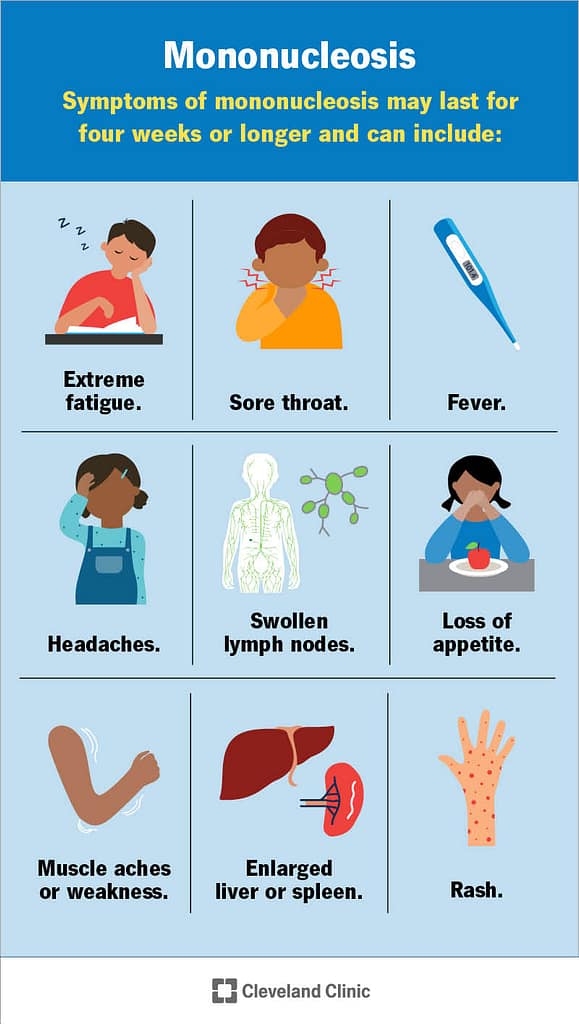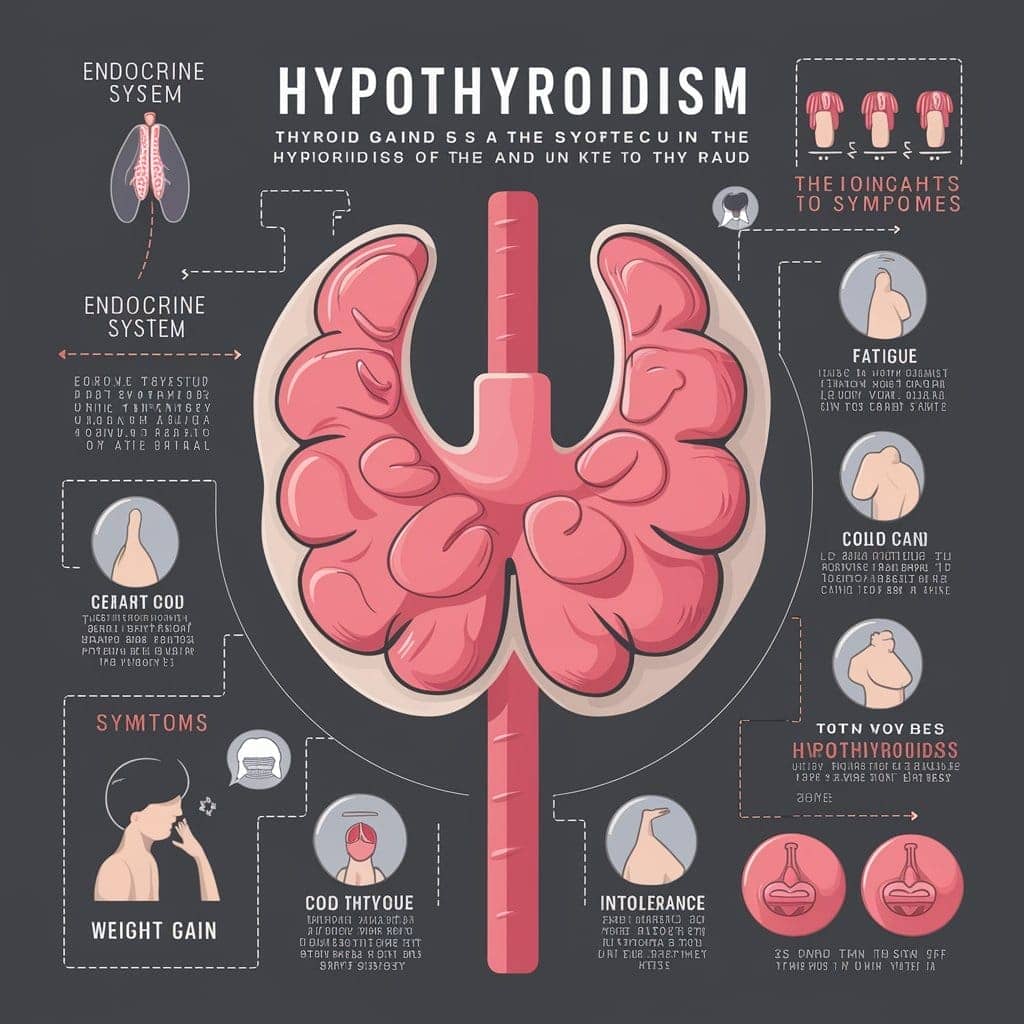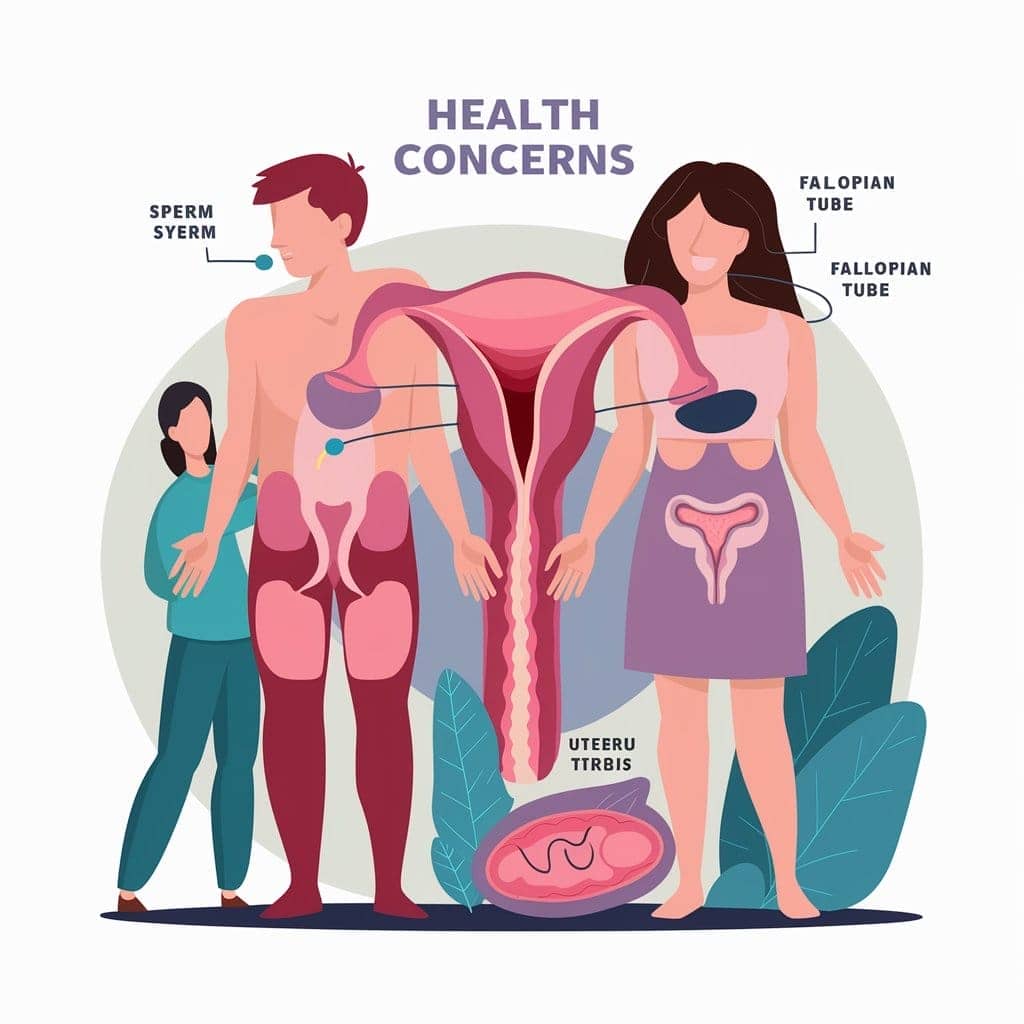Does Mono Cause a Cough in Adults? A Comprehensive Guide
Might you be surprised to learn that mononucleosis, commonly known as mono, can manifest a series of symptoms beyond its notorious fatigue? Adults suffering from mononucleosis often report various respiratory issues, including a persistent cough. This symptom may not be the hallmark of the disease but it still impacts many patients.
Mononucleosis, caused by the Epstein-Barr virus, has a wide range of manifestations, making it a slightly elusive illness to diagnose among adults. Although fever, sore throat, and swollen lymph nodes are more universally recognized symptoms, several studies indicate that approximately 20% of adults with mono experience persistent coughing. Treatment often involves supportive care, aimed at alleviating symptoms rather than directly combating the virus.
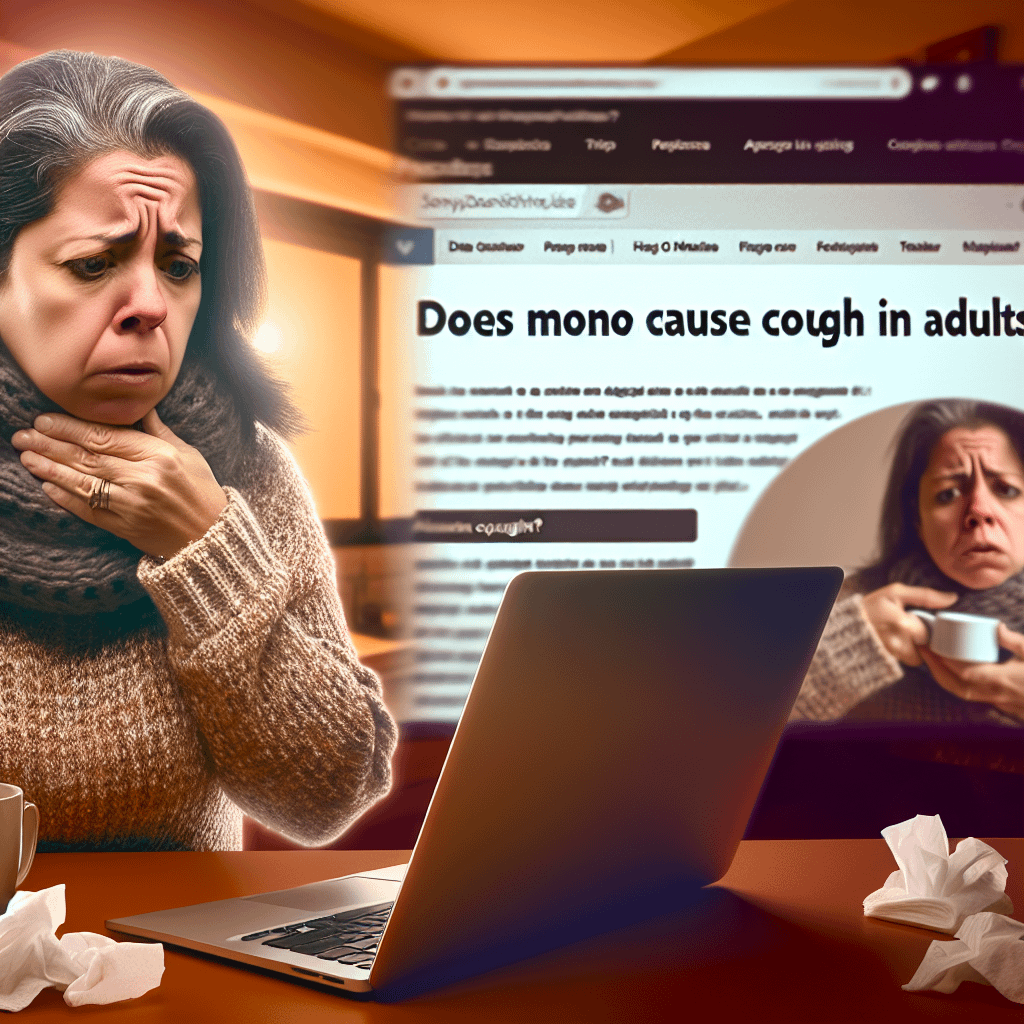
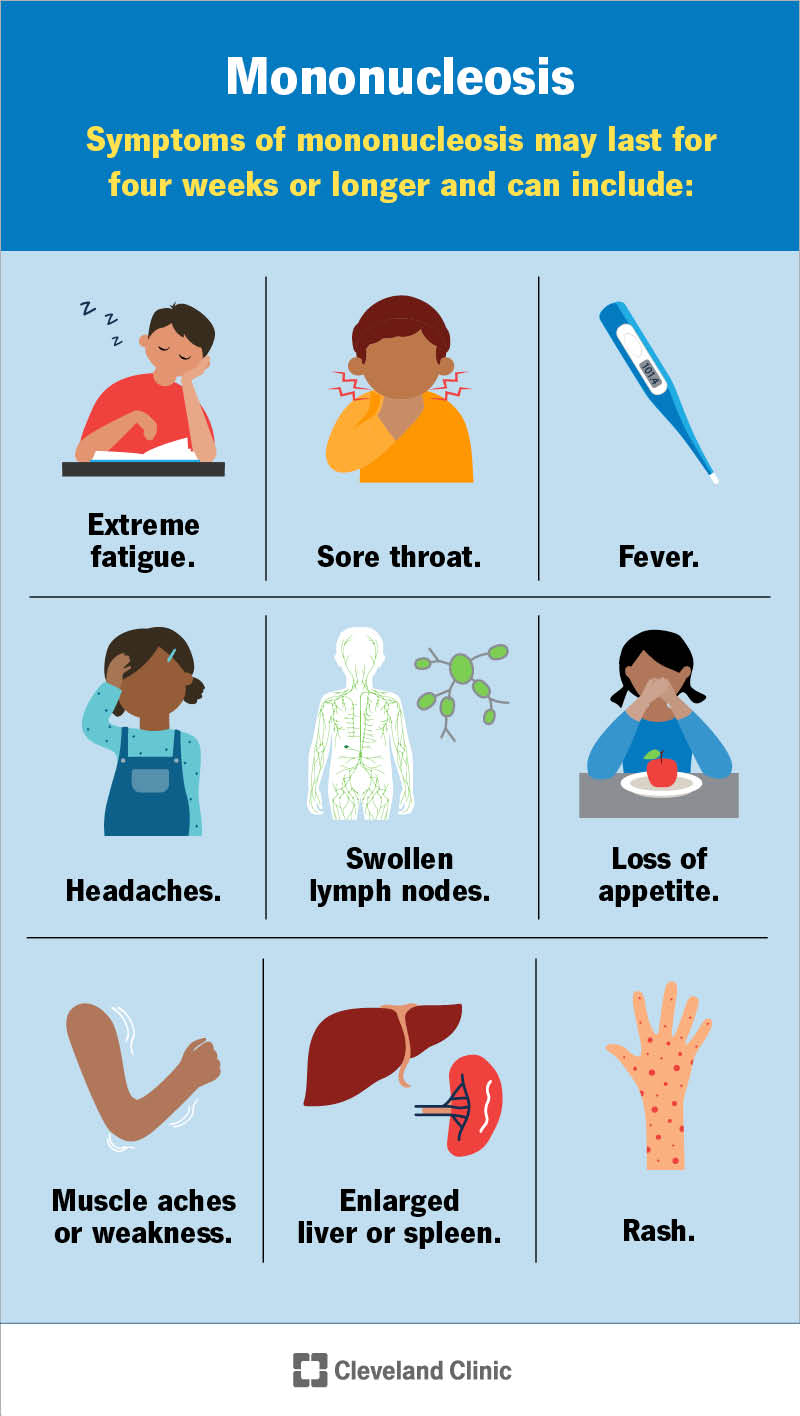
Source: clevelandclinic.org
Unveiling Mononucleosis: A Closer Look
Mononucleosis, often called mono, is an illness caused by the Epstein-Barr virus. This virus is a member of the herpes family and is very common. Symptoms can appear at any age but are most prevalent in teenagers and young adults.
Mono is typically spread through saliva, which is why it’s often referred to as the “kissing disease.” Besides kissing, sharing utensils or drinks can also spread the virus. Most people will be exposed to Epstein-Barr virus at some point in their lives.
Common symptoms of mono include a high fever, sore throat, and swollen lymph nodes. People often feel extremely tired and may need to rest for weeks. The fatigue from mono can be overwhelming and long-lasting.
Diagnosis of mono is usually confirmed through a blood test. Doctors look for specific antibodies that indicate the presence of the Epstein-Barr virus. Early diagnosis can help manage symptoms more effectively.
Mono’s Primary Symptoms
One of the most noticeable symptoms of mono is a severe sore throat. This can be so painful that it makes eating and drinking difficult. Swollen tonsils often accompany this symptom.
Fever is another common symptom, usually ranging from moderate to high. This can sometimes lead to chills and night sweats. Managing a fever with over-the-counter medicine is often recommended.
Swollen lymph nodes, particularly in the neck and armpits, are a typical sign of mono. This swelling is a result of the body’s immune response to the virus. It’s an indication that your body is fighting the infection.
Lesser-Known Symptoms of Mono
While less common, some people with mono may experience a skin rash. This rash can appear all over the body, and it’s typically not itchy. It’s important to differentiate this rash from other conditions.
Abdominal pain can also occur if the spleen becomes enlarged due to the infection. This can be quite serious and may require medical attention. Avoiding physical activities is often advised to prevent spleen injury.
Sometimes, people with mono may develop jaundice, which causes the skin and eyes to turn yellow. This happens if the liver is affected by the virus. Monitoring liver function in severe cases is crucial.
How Mono is Treated
There is no specific treatment for mono, but rest is essential. People with mono are advised to avoid strenuous activities to aid recovery. Getting plenty of sleep helps the body heal.
Over-the-counter pain relievers can help manage symptoms like fever and sore throat. Hydration is also crucial, as it helps maintain overall health. Drinking fluids like water and herbal tea is recommended.
In severe cases, doctors might prescribe steroids to reduce throat swelling. Antibiotics are not effective against the virus but may be used if a secondary bacterial infection occurs. Medical consultation is key for severe symptoms.
Infectious mononucleosis, Causes, Signs and Symptoms, Diagnosis and Treatment.
The Lesser-Known Symptom: A Persistent Cough
Mononucleosis, commonly known as mono, can sometimes present with a persistent cough. Though not the most common symptom, this cough can be bothersome for adults. Understanding why this happens is essential for better management.
The cough associated with mono is typically dry and unproductive. This means it doesn’t bring up mucus. This can make it more irritating and uncomfortable for patients.
One reason for the cough is the inflammation and swelling in the throat that mono causes. This irritation can lead to a reflexive cough. Proper treatment can ease this symptom.
Managing this cough requires a combination of rest and over-the-counter medications. Staying hydrated can also help soothe the throat. Consulting a healthcare provider is always recommended.
Why Mono Leads to a Cough
Mono can cause swelling in the upper respiratory tract, leading to a cough. This swelling irritates the airways and triggers a cough reflex. It’s the body’s way of trying to clear the irritation.
Persistent coughing in mono patients can also be a result of secondary infections. Sometimes, patients develop bronchitis or other respiratory problems. Addressing these infections is crucial for recovery.
Understanding the cause of the cough can help in choosing the right treatment. Simple measures like using a humidifier can provide relief. Such steps can significantly improve patient comfort.
Treating the Persistent Cough
To alleviate the cough, doctors often recommend using cough suppressants. These medications can reduce the cough reflex. They are available over-the-counter or by prescription.
Honey and warm teas can also soothe the throat and reduce coughing. These home remedies have been used for centuries. They are simple and effective.
In severe cases, steroids might be prescribed to reduce throat inflammation. This is typically for short-term relief. Always use medications as directed by a healthcare provider.
Preventing Complications from a Cough
Preventing the cough from worsening is crucial. Staying hydrated and resting can help. Avoiding irritants like smoke is also important.
If the cough persists for more than a few weeks, further medical evaluation might be needed. This is to rule out secondary infections. Monitoring symptoms is key to effective treatment.
Using a humidifier can keep the air moist and soothe irritated airways. This can make breathing more comfortable. Simple home adjustments can have a big impact.
Avoiding Misdiagnosis: The Link Between Mono Symptoms and Other Illnesses
Mononucleosis shares many symptoms with other illnesses, making it easy to misdiagnose. People often confuse mono with the flu or a severe cold. This confusion occurs because of similar symptoms like fever, sore throat, and fatigue.
Strep throat is another illness that can mimic mono’s symptoms. Both conditions present with a sore throat and swollen lymph nodes. Proper testing is essential to distinguish between the two.
Another common misdiagnosis is with tonsillitis. Mono can cause significant swelling and pain in the tonsils, which looks very similar to tonsillitis. Accurate diagnosis usually involves a blood test.
Sometimes, mono is mistaken for hepatitis due to liver involvement. Symptoms like jaundice and abdominal pain can overlap. A thorough medical examination helps ensure the correct diagnosis.
Dealing with Mono: Treatment Approaches
When treating mononucleosis, rest is crucial for recovery. Patients should listen to their bodies and avoid strenuous activities. This helps the immune system fight the infection more effectively.
Staying hydrated is also important for those with mono. Drinking plenty of fluids aids in keeping the throat moist and reduces discomfort. Water, herbal teas, and broths are excellent choices.
Pain relievers can help manage symptoms like fever and sore throat. Over-the-counter medications like ibuprofen or acetaminophen are commonly recommended. It’s essential to follow the dosage instructions provided.
Aside from medication, home remedies can offer relief too. Gargling with salt water can soothe a sore throat. Honey and lemon in warm water can also provide comfort.
In more severe cases, doctors might prescribe steroids to reduce throat swelling. This can help with breathing difficulties and severe pain. A healthcare provider will assess the need for such treatment.
Long-term management includes gradually resuming normal activities as energy levels improve. Patients should avoid contact sports to prevent spleen injury. Properly pacing recovery is vital to avoid relapses.
Preventing Mononucleosis: Practical Measures
Preventing mononucleosis involves basic hygiene practices that reduce the spread of the Epstein-Barr virus. Avoid sharing personal items like toothbrushes, utensils, and drinks. This minimizes direct exposure to saliva, the primary carrier of the virus.
Regular handwashing is highly effective in preventing the spread of mono. Soap and water help eliminate germs that might be present. Encourage frequent handwashing, especially after eating or using the restroom.
Schools and workplaces should promote awareness about the spread of mono. Educating people on how the virus transmits can help implement better preventative measures. Knowledge is a key tool in prevention.
Avoiding close contact with infected individuals can also prevent mono. Refrain from kissing or being in close proximity to someone with symptoms. Respecting personal space can significantly reduce risk.
Boosting your immune system can also help in prevention. A healthy diet, regular exercise, and enough sleep strengthen your body’s defenses. A strong immune system is your best defense against infections.
For those with mono, it’s crucial to inform close contacts. This allows others to take preventative steps and monitor for symptoms. Early awareness can prevent further spread of the virus.
Key Takeaways
- Mononucleosis can cause a persistent dry cough in adults.
- Throat inflammation from mono leads to coughing.
- This cough is usually non-productive and annoying.
- Proper rest and hydration help manage the cough.
- Coughing is not the most common symptom of mono.
:max_bytes(150000):strip_icc()/mononucleosis_symptoms-5ae7749c04d1cf003c3989ab.png)
Source: verywellhealth.com
Frequently Asked Questions
Here are some common questions and answers related to mononucleosis. These will help you understand the illness better and manage its symptoms effectively.
1. What is the primary cause of mononucleosis?
The primary cause of mononucleosis is the Epstein-Barr virus (EBV). This virus belongs to the herpes family and spreads mainly through saliva, earning mono its nickname “the kissing disease.” Most people will encounter EBV at some point in their lives.
While saliva is a common transmission route, mono can also spread by sharing utensils or drinks. Other possible but less frequent routes include blood transfusions and organ transplants. Practicing good hygiene can reduce your risk of contracting mononucleosis.
2. How long does it take to recover from mono?
Recovering from mononucleosis usually takes about two to four weeks for most people. However, fatigue can linger for several months even after other symptoms have subsided. Resting is crucial for recovery during this period.
Everyone’s recovery timeline varies based on factors like age, overall health, and severity of symptoms. It’s important to listen to your body and avoid strenuous activities until you’re fully healed.
3. Can adults get mono more than once?
It’s rare but possible for adults to get mononucleosis more than once in their lifetime. After initial infection, the Epstein-Barr virus remains dormant in the body but can reactivate under certain conditions such as stress or a weakened immune system.
Reactivation doesn’t always lead to noticeable symptoms or full-blown illness, but it can happen occasionally. If you experience recurrent mono symptoms, consult with a healthcare provider for management strategies.
4. Are there any effective home remedies for managing monosymptoms?
Certain home remedies can help manage the symptoms of mononucleosis effectively. Hydration is key; drinking plenty of fluids helps reduce sore throat discomfort and maintain overall health.
You can also try gargling with salt water to ease throat pain or using honey and lemon in warm water as a soothing drink. Plenty of rest and proper nutrition also play vital roles in speeding up recovery from mono.
5. When should one seek medical assistance for mono?
If you suspect you have mono and are experiencing severe symptoms like difficulty breathing, intense abdominal pain, or extreme weakness, it’s essential to seek medical assistance immediately.
A healthcare provider can offer proper diagnosis through blood tests and may prescribe medications like steroids if needed. Early intervention helps manage complications effectively and prevents further health issues related to mononucleosis.
Infectious Mononucleosis (Mono) Symptoms, Diagnosis, and Treatment
Conclusion
Understanding the complexities of mononucleosis, including its lesser-known symptoms like a persistent cough, is vital for effective management. Recognizing and addressing symptoms early can help avoid misdiagnosis and facilitate a quicker recovery. Proper rest, hydration, and medical guidance play crucial roles in treatment.
Moreover, preventive measures, such as good hygiene and avoiding close contact with infected individuals, are essential in reducing the spread of mono. Awareness and timely medical intervention can significantly improve health outcomes and quality of life. Staying informed empowers both patients and healthcare providers to tackle mononucleosis more efficiently.
